
The Righteous Brothers are an American musical duo originally formed by Bill Medley and Bobby Hatfield but now comprising Medley and Bucky Heard. Medley formed the group with Hatfield in 1963. They had first performed together in 1962 in the Los Angeles area as part of a five-member group called the Paramours, and adopted the name The Righteous Brothers when they became a duo. Their most active recording period was in the 1960s and '70s, and, after several years inactive as a duo, Hatfield and Medley reunited in 1981 and continued to perform until Hatfield's death in 2003. The music they performed is sometimes dubbed "blue-eyed soul".

Dino, Desi & Billy were an American singing trio that existed between 1964 and 1969. The group featured Dean "Dino" Martin, Desi Arnaz Jr., and their friend Billy Hinsche. A reconstituted version of the group performed between 1998 and 2010.

Ian & Sylvia were a Canadian folk and country music duo which consisted of Ian and Sylvia Tyson, née Fricker. They began performing together in 1959, married in 1964, and divorced and stopped performing together in 1975.

"Medley: Aquarius/Let the Sunshine In " is a medley of two songs written for the 1967 musical Hair by James Rado and Gerome Ragni (lyrics), and Galt MacDermot (music), released as a single by American R&B group the 5th Dimension. The song spent six weeks at number one on the US Billboard Hot 100 pop singles chart in the spring of 1969 and was eventually certified platinum in the US by the RIAA. Instrumental backing was written by Bill Holman and provided by session musicians commonly known as the Wrecking Crew. The actual recording was novel at the time, being recorded in two cities, Los Angeles and Las Vegas, and being mixed down to a final version later.

The Lettermen are an American male pop vocal trio. The Lettermen's trademark is close-harmony pop songs with light arrangements. The group started in 1959. They have had two Top 10 singles, 16 Top 10 singles on the Adult Contemporary chart, 32 consecutive Billboard chart albums, 11 gold records, and five Grammy nominations.

"You've Lost That Lovin' Feelin'" is a song by Phil Spector, Barry Mann and Cynthia Weil, first recorded in 1964 by the American vocal duo the Righteous Brothers, whose version was also produced by Spector and is cited by some music critics as the ultimate expression and illustration of his Wall of Sound recording technique. The record was a critical and commercial success on its release, reaching number one in early February 1965 in both the United States and the United Kingdom. The single ranked No. 5 in Billboard's year-end Top 100 of 1965 Hot 100 hits – based on combined airplay and sales, and not including three charted weeks in December 1964 – and has entered the UK Top Ten on an unprecedented three occasions.

William Thomas "Bill" Medley is an American singer and songwriter, best known as one half of The Righteous Brothers. He is noted for his bass-baritone voice, exemplified in songs such as "You've Lost That Lovin' Feelin'". Medley produced a number of the duo's songs, including "Unchained Melody" and "(You're My) Soul and Inspiration,"

"Wondrous Place" is a song written by Jeff Lewis and Bill Giant and first released by American singer Jimmy Jones on his debut album Good Timin' in May 1960. English singer Billy Fury released a version as a single in September 1960.

"Just Once in My Life" is a song written by Gerry Goffin, Carole King and Phil Spector. The song was released by the Righteous Brothers in 1965 and reached No. 9 on the Billboard Hot 100.
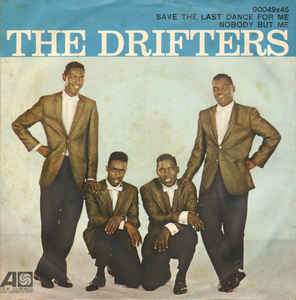
"Save the Last Dance for Me" is a song written by Doc Pomus and Mort Shuman, first recorded in 1960 by the Drifters, with Ben E. King on lead vocals. It has since been covered by several artist including Dalida, The DeFranco Family, Emmylou Harris, Dolly Parton, and Michael Bublé.

"Hurt So Bad" is a song written by Teddy Randazzo, Bobby Weinstein, and Bobby Hart. It is a classic 1965 Top 10 hit ballad originally recorded by Little Anthony & The Imperials. Linda Ronstadt also had a Top 10 hit with her cover version in 1980. The song has been re-recorded by numerous artists including The Lettermen, who took the song to number twelve in September 1969.
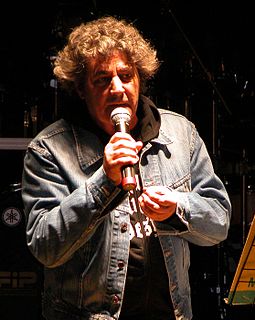
Faustino (Fausto) Leali is an Italian pop singer.
"She Cried" is a song written by Ted Daryll and Greg Richards, and it was initially recorded by Ted Daryll in July 1961, but was a big hit when covered by Jay and the Americans for their 1962 album, She Cried. In 1962 the song reached number 5 on the Billboard Hot 100 and number 1 on WLS. The song was the group's first major hit.

"Traces" is a 1968 song by the American rock band Classics IV. Released as a single in January 1969, the cut served as the title track off the album of the same name. Written by Buddy Buie, J. R. Cobb, and Emory Gordy Jr., the song peaked at No. 2 on 29 March 1969 on the Hot 100, as well as No. 2 on the Easy Listening music charts, making it the highest-charting single by the Classics IV. The song is noted for its use of an oboe, heard in the introduction, as well as a string section.
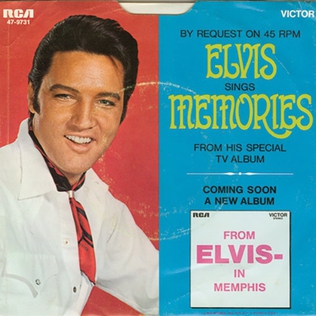
"Memories" is a 1968 song originally recorded by Elvis Presley.
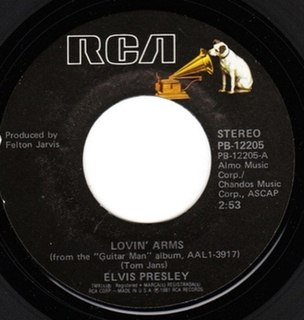
"Loving Arms" is a song written by Tom Jans and first recorded and released by Kris Kristofferson and Rita Coolidge as a duet in 1973 on their album Full Moon.

"I'd Never Find Another You" is a song written by Gerry Goffin and Carole King and first released by American singer Tony Orlando on his album Bless You and 11 Other Great Hits in September 1961.

"Do You Really Love Me Too" is a song written by Mark Barkan and Ben Raleigh and first released by American pop singer Barbara Chandler as the flip side to "I Live to Love" in October 1963. Originally called "Fool's Errand", it was renamed "Do You Really Love Me Too" on the UK release of the single in December 1963.
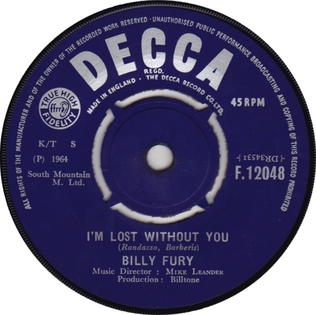
"Lost Without You" is a song written by American songwriters Teddy Randazzo and Billy Barberis and first released by Randazzo as a single in September 1964. It was not as successful as some of his previous releases, only peaking at number 130 on the Billboard Bubbling Under the Hot 100. The song had more success in the UK after it was covered by English singer Billy Fury, who released his version titled "I'm Lost Without You".

"Letter Full of Tears" is a song written by American singer-songwriter Don Covay and released by Gladys Knight & the Pips as a single in November 1961. It became their second top-20 hit, peaking at number 19 on the Billboard Hot 100. The song was covered the following year by English singer Billy Fury who had a minor hit with it.



















